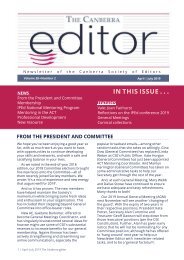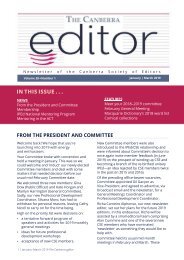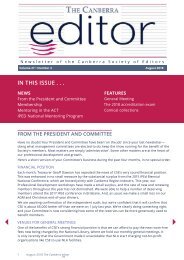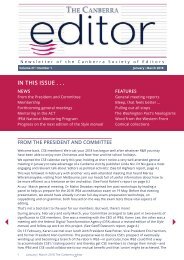The Canberra editor
Newsletter of the Canberra Society of Editors
Newsletter of the Canberra Society of Editors
You also want an ePaper? Increase the reach of your titles
YUMPU automatically turns print PDFs into web optimized ePapers that Google loves.
Did you hear about the cross-eyed teacher who lost her job because she couldn't control her pupils?<br />
Spell checker<br />
Eye halve a spelling checker;<br />
It came with my pea sea.<br />
It plainly marks four my revue,<br />
Miss steaks eye kin knot sea.<br />
Eye strike a key and type a word,<br />
And weight four it two say,<br />
Weather eye am wrong oar write;<br />
It shows me strait a weigh.<br />
As soon as a mist ache is maid,<br />
It nose bee fore two long.<br />
And eye can put the error rite;<br />
Its rare lea ever wrong.<br />
Eye have run this poem threw it;<br />
I am shore your pleased two no,<br />
Its letter perfect awl the weigh.<br />
My spell checker tolled me sew!<br />
Julia Turner Creation<br />
English language background<br />
It is good when students from other countries come to study in Australia,<br />
spend their entire academic lives in Australia and write essays and<br />
dissertations for several years, improving their English all the time. By<br />
the time they reach the PhD thesis writing stage, they have a good<br />
grasp of English grammar, and their theses can be edited, knowing that<br />
only occasional queries about meaning and structure are necessary.<br />
Remember, under the Institute of professional <strong>editor</strong>s (IPEd) guidelines,<br />
we copy-edit only. We do not change meaning and we do not rewrite<br />
content—we point out problems in both those areas and pass the<br />
problem back to the student and their supervisor.<br />
However, there seem to be many more students coming to Australia<br />
solely for the purpose of acquiring a PhD by research. It seems to me<br />
that they have very little useful background in writing in English in their<br />
earlier academic life. Somehow, nobody has told them that their thesis<br />
has to be in reasonable English, so that meaning is not ambiguous and so<br />
that content is relevant and has been checked by their supervisory panel<br />
before they seek permission to employ outside professional <strong>editor</strong>ial help.<br />
Don’t get me wrong: home-grown PhD candidates can have some of<br />
the same problems because there was a very long period in Australian<br />
educational history when English grammar was barely taught at all. But at<br />
least home-grown students have grown up speaking English and making<br />
themselves understood.<br />
English grammar classes<br />
All universities have ‘study skills centres’ or some such advisory service<br />
that students can attend to brush up their English grammar and academic<br />
writing style before they embark on a major work like a thesis. I wonder<br />
how many students avail themselves of this service.<br />
<strong>The</strong>re are classes available in the community to help people come to grips<br />
with English. It should be mandatory for students to have to prove their<br />
proficiency in basic English writing skills before being accepted as PhD<br />
candidates.<br />
Continuing to write in English?<br />
Students who want to continue to write in English after they graduate—<br />
for instance, to write journal articles or to work in a job where English<br />
writing skills are useful to them—are a joy to help. Many, however, seem<br />
to have no reason to continue with English for any longer than necessary<br />
to get the doctorate. <strong>The</strong> latter are hard to help as they seem to expect<br />
the <strong>editor</strong> to ‘fix’ everything. That won’t work.<br />
What would I do about it?<br />
I would amend the IPEd guidelines to include an injunction to supervisors<br />
of research students that they read their students’ draft theses to make<br />
certain that these documents are editable at all before giving their<br />
permission for the student to seek professional editing help. I would also<br />
suggest that <strong>editor</strong>s make it clear in a disclaimer in their quotes to PhD<br />
candidates, in particular, that they cannot do anything that will alter the<br />
meaning of text or change content or do any ‘structural’ editing—that<br />
they are permitted to ‘copy-edit’ only, following what is set out in Parts<br />
D and E of the Australian standards for editing practice (ASEP) guidelines,<br />
referred to in the IPEd website page Editing research theses.<br />
I would offer to help the candidate with some of the most glaring<br />
grammatical issues, at a different fee from the editing fee, before<br />
editing the actual thesis. I don’t recommend this to all <strong>editor</strong>s because I<br />
know that not all <strong>editor</strong>s are good teachers as well as good <strong>editor</strong>s. It’s<br />
something I have done very successfully with PhD candidates from<br />
overseas who have been keen to improve their English and willing to<br />
put the effort into it. If you can teach, do use that skill. I have used the<br />
9 March | April 2016 <strong>The</strong> <strong>Canberra</strong> <strong>editor</strong>

















